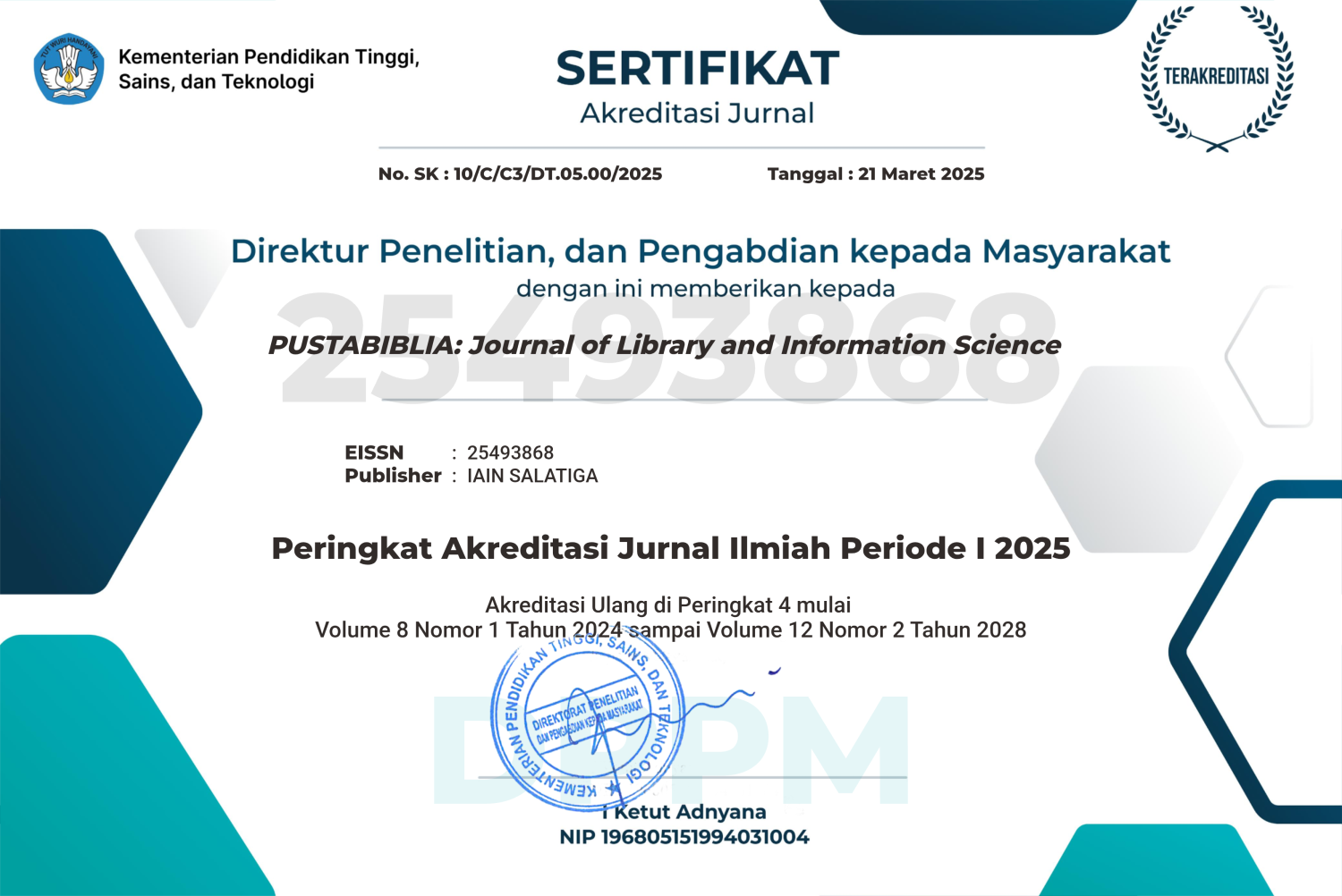Application of the International Cataloguing Principles in the National Library of Indonesia
DOI:
https://doi.org/10.18326/pustabiblia.v8i2.2975Keywords:
International Cataloguing Principles, National Library of Indonesia, General principlesAbstract
This paper discusses the application of the General Principles from the International Cataloguing Principles (ICP) in the cataloging process of information resources at the National Library of Indonesia. The study employs a qualitative method, with data collected from key informants within the institution. The objective is to assess whether the National Library of Indonesia, as the supervisory body for all types of libraries in Indonesia, adheres to the general rules established in the ICP. As a supervisory institution, the National Library of Indonesia is expected to set a good example for all libraries in Indonesia by effectively conducting the cataloging process for its collections. Additionally, this institution plays a crucial role in preserving Indonesia's library materials as evidence of the nation's history and civilization.
References
Badan Pengembangan dan Pembinaan Bahasa, Kementerian Pendidikan, Kebudayaan, Riset, dan Teknologi Republik Indonesia. (2024, August 13). KBBI VI Daring. Retrieved from Badan Pengembangan dan Pembinaan Bahasa: https://kbbi.kemdikbud.go.id/entri/katalog
Bamise, O. F., Oluwaniyi, J. T., & Igbeneghu., B. I. (2019). Evaluation Of cataloguing and classification competencies of librarians in Nigerian academic libraries. International Journal of Library and Information Science Studies, 1-12.
Bawden, D., & Robinson, L. (2022). Introduction to Information Science. Facet.
Bruce J. Evans, J. A.-G. (2023). Core Competencies for Cataloging and Metadata Professional Librarians: Assessment of Community Use and Recommendations for the Future of the Document. Library Resources & Technical Services , 114-123.
Cataloguing and Classification Practices for Quality Services Delivery by Library Professionals in Institutions in Kwara State, Nigeria. (2022). Library Philosophy and Practice, 1-18.
Goodness Tochi Akalawu, N. A. (2023). Cataloguing Knowledge as Correlates of Cataloguers' Job Performance in Libraries in Ogun State, Nigeria. Library Philosophy and Practice.
Hjørland, B. (2012). Is classification necessary after Google? Journal of Documentation, 299-317.
Hjørland, B., & Pedersen, K. N. (2005). A substantive theory of classification for information retrieval. Journal of Documentation, 582-597.
International Federation Library Associations and Institutions. (2016). Statement of International Cataloguing Principles (ICP). Den Haag: IFLA.
Joudrey, D. N., Taylor, A. G., & Miller, D. P. (2015). Introduction to Cataloging and Classification. California: Library and Information Science Text Series.
Miles, M. B., Huberman, A. M., & Saldana, J. (2014). Qualitative data analysis: A methods sourcebook (3rd ed.). SAGE Publications.
Park, J.-R., & Howarth, L. C. (2013). New Direction In Information Organization . Emerald Group Publishing Limited.
Ranganathan, S. R. (1931). The Five Laws of Library Science. Madras Library Association.
Republik Indonesia. (2007). Undang-undang Republik Indonesia Nomor 43 Tahun 2007. Indonesia: Sekretariat Negara.
Sugiyono. (2017). Metode penelitian kuantitatif, kualitatif, dan R&D. Bandung: Alfabeta.
Sulistyo-Basuki. (1991). Pengantar Ilmu Perpustakaan. Jakarta: Gramedia Pustaka Utama.
Szostak, R. (2008). Classification, interdisciplinarity, and the study of science. Journal of Documentation, 319-332.
Yin, R. K. (2018). Case study research and applications: Design and methods (6th ed.). SAGE Publications.
Downloads
Published
Issue
Section
License
Copyright (c) 2024 Fandi Rahman Hidayat, Nina Mayesti

This work is licensed under a Creative Commons Attribution-ShareAlike 4.0 International License.
Copyright
Authors retain copyright and grant the journal right of first publication with the work simultaneously licensed under a Creative Commons Attribution-ShareAlike 4.0 International License. In line with the license, authors are allowed to share and adapt the material. In addition, the material must be given appropriate credit, provided with a link to the license, and indicated if changes were made. If authors remix, transform or build upon the material, authors must distribute their contributions under the same license as the original.
Licensing

This work is licensed under a Creative Commons Attribution-ShareAlike 4.0 International License.







